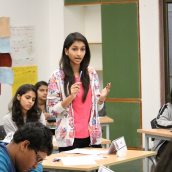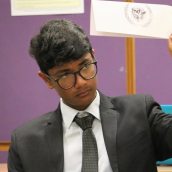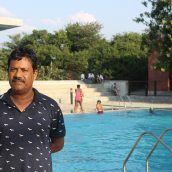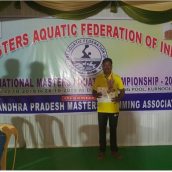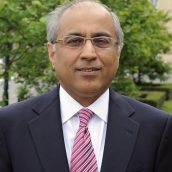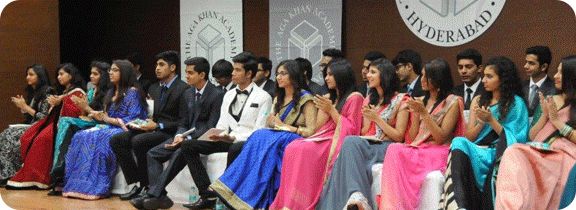
International Baccalaureate
The International Baccalaureate (IB) is a non-profit educational foundation, motivated by its mission to create a better world through education. IB programmes for students aged 3 to 19 help develop their intellectual, personal, emotional and social skills to live, learn and work in a rapidly globalising world.
The Aga Khan Academy Hyderabad has been authorised as an IB World School offering the IB Primary Years, Middle Years and Diploma Programmes.
IB World Schools share a common philosophy – a commitment to improve the teaching and learning of a diverse and inclusive community of students by delivering challenging, high quality programmes of international education that share a powerful vision.
Aims of the IB programme
Founded in 1968, the International Baccalureate currently works with schools in 144 countries to develop and offer their programmes to over one million students.
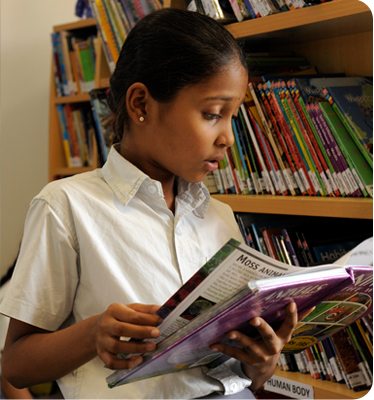 The IB mission statement declares:
The IB mission statement declares:
"The International Baccalaureate aims to develop inquiring, knowledgeable and caring young people who help to create a better and more peaceful world through intercultural understanding and respect. To this end the organisation works with schools, governments and international organisations to develop challenging programmes of international education and rigorous assessment. These programmes encourage students across the world to become active, compassionate and lifelong learners who understand that other people, with their differences, can also be right."
Primary Years Programme
The Primary Years Programme (PYP) at the Academy, for students aged 6–10, focuses on the development of the whole child, addressing social, physical, emotional and cultural needs, while giving students a strong foundation in all of the major areas of knowledge. Through the PYP, children become aware of and sensitive to the points of view of people in other parts of the world.
Middle Years Programme
The Middle Years Programme (MYP), for students aged 11–16, integrates the study of all the major disciplines, including languages, sciences, literature and the social sciences, mathematics, arts, technology and physical education. The MYP normally includes a service component designed to encourage students to become involved with their communities.
Diploma Programme
The Diploma Programme (DP), for students aged 16–19, is a two-year course of study that prepares students for university. All DP students study languages, a social science, an experimental science, mathematics and, usually, an arts subject.
At the same time as it provides a form of academic passport, the DP generally fulfils the requirements of a student's national education system. Each student's performance is evaluated by independent examiners and measured by his or her levels of knowledge and skills relative to set standards applied to all schools.
For further information about the International Baccalaureate and its programmes, please visit the IB website.
Asad Bogani: The Adventure of a Lifetime
Leaving one’s home and family is a daunting task for any person, but even more so for children. However, the lure of a better education and a new adventure can provide ample motivation for students to leave everything they know and follow their dreams.
For grade nine student Asad Bogani leaving his family and friends in Dubai and traveling to India to attend the Aga Khan Academy (AKA) in Hyderabad was a personal decision rooted in a need to become his own person.
“It was something of a personal decision on my side. I really love Dubai [it is] my home, but I thought I should try something out of my comfort zone. I decided I should be on my own now and live by myself.”
The AKA has allowed students to not only have access to a world-class education but also activities that will help them with interpersonal growth. “I play football, volleyball, a bit of basketball, but my favorite sport is cricket,” says Asad, who is looking forward to playing cricket at the Academy.
Beyond extracurricular activities the students’ time is also taken up by personal chores. “There’s so many activities going on and you have your own life, like cleaning your cupboard and keeping neat; a lot of things happening as compared to my life in Dubai,” explains Asad.
Though Asad is finding lots to enjoy about his experience at the AKA there are always challenges to uprooting oneself from familiar surroundings. “My parents really miss me and I’m really missing home as well, but they’re supporting me and what I’m trying to do here,” he says.
But a little bit of homesickness is a small price to pay for a future that he will now be able to look forward to, one he hopes will mesh his love for sports, especially cricket, with his favorite subject—Mathematics.
“Maths is really fun to do. I’d love to do something related to Maths, like statistics and join it with sports, like a sports statistician, something related to cricket because that’s my love. I’d really like to combine the two of them and work towards making that as my career. After completing my diploma program here I’m aiming for university in England and onto my career.”
With ambitions and an educational foundation that will go the distance, Asad is well on his way to creating the life he’s imagined for himself.
Syeda Sayema Mayesha – tackling global issues through film
Watch Sayema's film "One Sky, Two Souls" below.
Sayema, currently in grade 11, directed and produced an impactful short film to create awareness on child rights for her IB MYP Personal Project towards the end of her IB Middle Years Programme journey. The film was screened in February 2017 at the Academy’s annual ‘innovation expo’.
What caused her to pursue this particular project? “I was inspired to make this film as I have often observed how privileged children do not appreciate what they have, whereas the ones who suffer continue to do so as they are neglected,” Sayema explains. “As a student of the Academy, where children are given the opportunity of holistic education regardless of their financial background, I could not have worked on a better project.”
Sayema is from Bangladesh and studied at the Aga Khan School in Dhaka before joining the Hyderabad Academy in 2014. Her favourite subject is I&S (Individuals and Societies), particularly Economics, because she loves how it engages students and sharpens their perception about the real world. “15 years from now, I see myself completing my higher studies in International Relations and working as a Public Relations Executive. The Academy has influenced this career choice as it has broadened my knowledge and perspective about the world making me enthusiastic to be a leader and play a part in constructive change.”
Soccer is a passion for Sayema, and she has been part of the Academy Senior School girls’ soccer team from the beginning. “It has been a splendid experience for me to play home ground tournaments as well as outside tournaments and win the first ever trophy for the team in Kerala.” Another momentous occasion for her was when she won the ‘Best Delegate Award’ at her first ever Academy Model United Nations in 2015. She is now a passionate MUN participant.
Her knowledge of global issues and her desire to contribute to social change is evident through the film that she made, discussing child rights through the angle of education and labour. “Ensuring child rights today will ensure a brighter future for all tomorrow. The entire process has taught me many aspects of filmmaking. It has taught me to become a leader while working with a team. I have learnt how to deliver stories to the world through my own lens.”
Watch Sayema's film:
Master debater Aryan Srivastava of grade 11 spearheads MUN team
What’s next for our expert debater? “I really want to get into law and politics,” answers Aryan. “I think MUN has prepared me a lot for that. Plus, I’m passionate about world events.”
Professional swimmer K. Surendra leads Academy swim team to victory
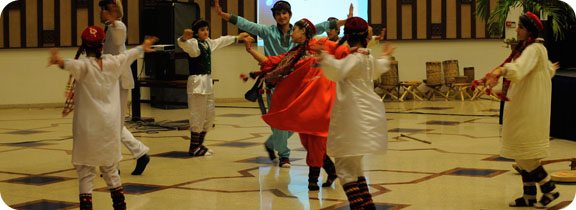
International Exchanges
As the network of Aga Khan Academies becomes further established, we will offer our students the opportunity to broaden their experience through exchanges with other Academies.
The Aga Khan Academy Mombasa will include an international exchange programme as part of the Senior School curriculum. This will provide our students with the opportunity to study for an extended period in another of the 18 Academies (planned or currently under development) in Africa, South and Central Asia, and the Middle East.
An inaugural programme is planned for the 2018-19 academic year for grade 9 students at the Aga Khan Academy Mombasa and the Aga Khan Academy Hyderabad. The programme will grow over the coming years, drawing in more Academies as they open and giving students the opportunity to experience life in a range of different countries and cultures.
Campus life
Students from Mombasa who participate in an exchange with another Academy will live in residential facilities in a secure campus setting.
Campus life is an important part of the international exchange programme. Many of the least tangible but most important elements of an education – the development of practical leadership skills, the capacity to make ethical judgments, the ability to navigate through complex cultural settings – are formed outside the classroom. Mealtimes and other informal gatherings offer opportunities for discussion, meetings, and study groups.
The exchange will offer a structured programme of activities, both on and off-campus. This is designed to increase students’ understanding of their own and other cultural identities, to recognise different components of culture, to interact with the local community through service learning, and to reach a comparative understanding of the process of development in another country.
Benefits of study abroad
The International Baccalaureate programme is implemented through the medium of English at all Aga Khan Academies. The common curriculum will allow students to study abroad without facing uncertainties regarding compatibility of course study or examinations. Students will also learn to appreciate and respect other nationalities, cultures and intellectual traditions through direct contact with people in other countries. They will broaden their worldview and learn to be at ease in different cultural settings.
The exchange will increase students’ willingness and ability to collaborate across borders and cultures, as they form networks of friendships across the world. It will build the strength of character necessary for ethical and pluralistic leadership. Students will develop greater adaptability and resilience as they learn to overcome the challenges of living in a new cultural setting with local peers.
For further information on the educational programme offered at the Aga Khan Academy Mombasa, please visit the Academic Programme page.
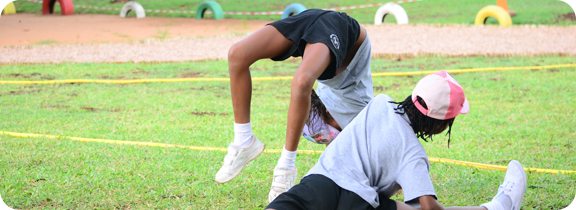
Co-curricular Programmes
Co-curricular programmes enable students to realise their potential in a variety of settings beyond the classroom. Students develop a sense of self-awareness and an understanding of school and community needs and opportunities. They also learn how to apply their gifts and skills to make a positive impact.
At the Academy, we believe in a balanced, rounded, comprehensive school experience. As this includes both academic and co-curricular experiences, we encourage our students to do their best both in and outside the classroom.
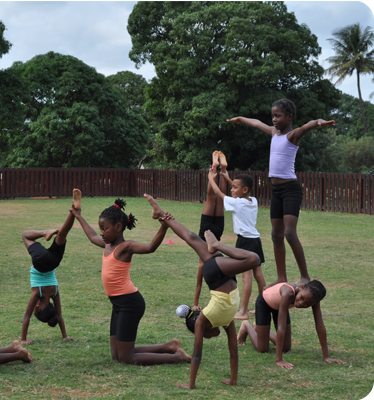 We will offer outstanding sports facilities that will include:
We will offer outstanding sports facilities that will include:
- swimming and diving pools
- cricket, soccer and hockey pitches
- basketball and volleyball areas
- tennis and squash courts
- dance studio
- gymnasium
- athletics tracks.
Children with special sporting gifts will be encouraged to develop their talents in every way. Children with special gifts in music, art or drama will similarly be encouraged through opportunities to practise and perform while at the Academy.
Our co-curricular programmes are clustered into three main streams, each with a different focus:
Creative expression
Whether through visual or performing arts, this cluster engages students to think creatively and express their identities and thoughts aesthetically. Through theatre, art, music and drama, students learn to work together and infuse their projects with values and lessons from other parts of their schooling. Individual and collaborative creative projects emphasise growth and development through personal challenge, ultimately resulting in achievable personal goals.
Action
The student as a reflective practitioner is a basic tenet of the action cluster. Through physical sport – both competitive and non-competitive – students are challenged in their physical growth, and learn values such as good sportsmanship, teamwork and ethical behaviour. We encourage them to extend themselves by trying different activities and working with teammates to pass on their knowledge. In line with developing the student as a whole, a healthy lifestyle complements and enhances academic achievement.
"The Academies will be concerned with the whole of the human being – mind, body and spirit – and with the broad range of human aspiration – intellectual, moral, artistic, physical and spiritual. The fact that these are residential academies will contribute enormously to these broad objectives, encouraging students to identify more completely with the school, to help lead it and shape its environment."
Citizenship
At the Academy, we encourage knowledge and understanding of humanity and civil society. Through their involvement in citizenship activities, students gain an understanding of the practical implications of their work and study. By collaborating with community groups on sustainable projects, they develop an appreciation for human rights and human dignity, and of how their actions impact the world around them.
To learn more about the Academy's programme, please visit the Academic Programme page.

International Exchanges
As the network of Aga Khan Academies becomes further established, we will offer our students the opportunity to broaden their experience through exchanges with other Academies.
The Aga Khan Academy Dhaka will include an international exchange programme as part of the Senior School curriculum. This will provide our students with the opportunity to study for an extended period in another of the 18 Academies (planned or currently under development) in Africa, South and Central Asia, and the Middle East.
An inaugural programme is planned for the 2018-19 academic year for grade 9 students at the Aga Khan Academy Mombasa and the Aga Khan Academy Hyderabad. The programme will grow over the coming years, drawing in more Academies as they open and giving students the opportunity to experience life in a range of different countries and cultures.
Campus life
Students from Dhaka who participate in an exchange with another Academy will live in residential facilities in a secure campus setting.
Campus life is an important part of the international exchange programme. Many of the least tangible but most important elements of an education – the development of practical leadership skills, the capacity to make ethical judgments, the ability to navigate through complex cultural settings – are formed outside the classroom. Mealtimes and other informal gatherings offer opportunities for discussion, meetings, and study groups.
The exchange will offer a structured programme of activities, both on and off-campus. This is designed to increase students’ understanding of their own and other cultural identities, to recognise different components of culture, to interact with the local community through service learning, and to reach a comparative understanding of the process of development in another country.
Benefits of study abroad
The International Baccalaureate programme is implemented through the medium of English at all Aga Khan Academies. The common curriculum will allow students to study abroad without facing uncertainties regarding compatibility of course study or examinations. Students will also learn to appreciate and respect other nationalities, cultures and intellectual traditions through direct contact with people in other countries. They will broaden their worldview and learn to be at ease in different cultural settings.
The exchange will increase students’ willingness and ability to collaborate across borders and cultures, as they form networks of friendships across the world. It will build the strength of character necessary for ethical and pluralistic leadership. Students will develop greater adaptability and resilience as they learn to overcome the challenges of living in a new cultural setting with local peers.
For further information on the educational programme offered at the Aga Khan Academy Mombasa, please visit the Academic Programme page.
Director's Welcome
Director of AcademiesThe Aga Khan Academies are a network of schools being established by His Highness the Aga Khan in countries across South and Central Asia, Africa and the Middle East.
As the Director of Academies, I have been entrusted with His Highness’s extraordinary vision for the Academies as a global learning community, where young people develop the capacity to become future leaders of civil society.
The underlying idea of the Aga Khan Academies network is to concentrate substantial resources on those exceptional individuals – students and teachers – who have the potential to transform society. When provided with a world-class education, exceptional students from any background can achieve their significant potential and in so doing improve their lives, the lives of their families, their communities, their country and the world.
At this time, we envisage a network of approximately 18 campuses across 14 countries that, when fully developed, will be teaching 14,000 students.
Each Aga Khan Academy will reach out to students of all backgrounds, regardless of culture, race, religion or financial circumstance.
The Academies follow the International Baccalaureate (IB) curriculum, ensuring a global standard of educational excellence and external validation through the annual IB Diploma exams.
The Academies also work to enhance the quality of teaching, the base on which good education rests. Each Aga Khan Academy will provide professional development programmes for teachers and school leaders from within the Academy as well as from government and other schools.
The students in our existing Academies are already achieving exceptional results across domains spanning academics, athletics and the arts. And our alumni, many of whom attend leading universities around the world, are demonstrating a deep sense of social responsibility and a commitment to return to serve their home countries.
Ultimately, we hope that the qualities of good leadership – sound moral judgment, self-discipline, a pluralistic outlook and civic responsibility – are the qualities that will distinguish Aga Khan Academy graduates.
"Our goal, then, is not to provide special education for a privileged elite – but to provide an exceptional education for the truly exceptional." I invite you to explore our website further to learn more about the Aga Khan Academies and the unique and innovative programme they offer.
With warm wishes,
Salim A.L. Bhatia
Director of Academies
Mwanapwani Said: Inspired to make a difference
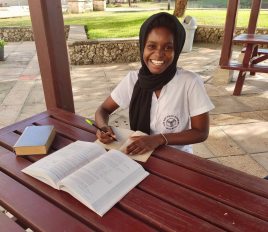 Year 10 student Mwanapwani Said, who comes from Msambweni in Kwale County, joined the Aga Khan Academy Mombasa in 2017 on a full scholarship through the Talent Identification Programme (TID). This programme is developed in line with the Academy’s vision to provide exceptional students with an international-standard education and leadership opportunities, regardless of their ability to pay.
Year 10 student Mwanapwani Said, who comes from Msambweni in Kwale County, joined the Aga Khan Academy Mombasa in 2017 on a full scholarship through the Talent Identification Programme (TID). This programme is developed in line with the Academy’s vision to provide exceptional students with an international-standard education and leadership opportunities, regardless of their ability to pay.
When she first received the news that she had been accepted to the Academy, Mwanapwani was elated and thankful. She was excited about studying under the Academy’s unique and holistic curriculum because she knew it was going to be a life-changing opportunity that would open many doors for her.
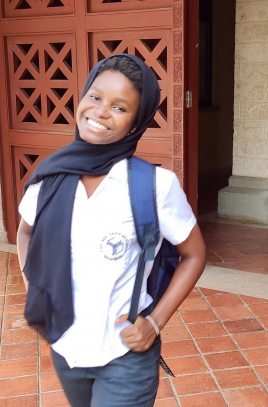 “I felt so grateful about receiving a full scholarship because it greatly reduced my financial burden. I became more driven than ever to create a fully rewarding experience for myself,” Mwanapwani said.
“I felt so grateful about receiving a full scholarship because it greatly reduced my financial burden. I became more driven than ever to create a fully rewarding experience for myself,” Mwanapwani said.
Having been at the Academy for nearly four years now, Mwanapwani has availed herself of every opportunity to strive for the better. Her growth has been reflected in academics as well as sports, where she has picked up a passion for football. In addition, being selected to participate in the Exchange Programme with AKA Hyderabad exposed her to a new culture, one that enabled her to gain an understanding of her identity and values whilst appreciating the varying perspectives of others.
Commenting on how the Academy has shaped her outlook on life, Mwanapwani stated: “The Academy has changed me for the better as I now know more about myself. Learning to have a pluralistic approach has taught me to be respectful of the opinions and values of others. I have also learnt to work well with others because I believe great things can be achieved when we work together and I feel like this is an important aspect that will help me in the future.”
"Mwanapwani is a very cheerful and conscious student. She is upbeat about life and hardly sees challenges as hurdles, but rather as trophies on her way up. Having been selected from TID, she has proved her mettle over the years in her Middle Years Programme. She is all-rounded, self-driven and radiates an aura of confidence around her peers. I consider myself fortunate to be around this positive personality," said Head of Residential Life Benson Wafula about Mwanapwani.
An aspiring health professional, Mwanapwani’s vision is crystal clear. She is duty-bound to make a difference.
“I feel like I have been prepared for the real world, to be mindful of others and to give back. I want to work hand in hand with members of my community to make a change in society.”
